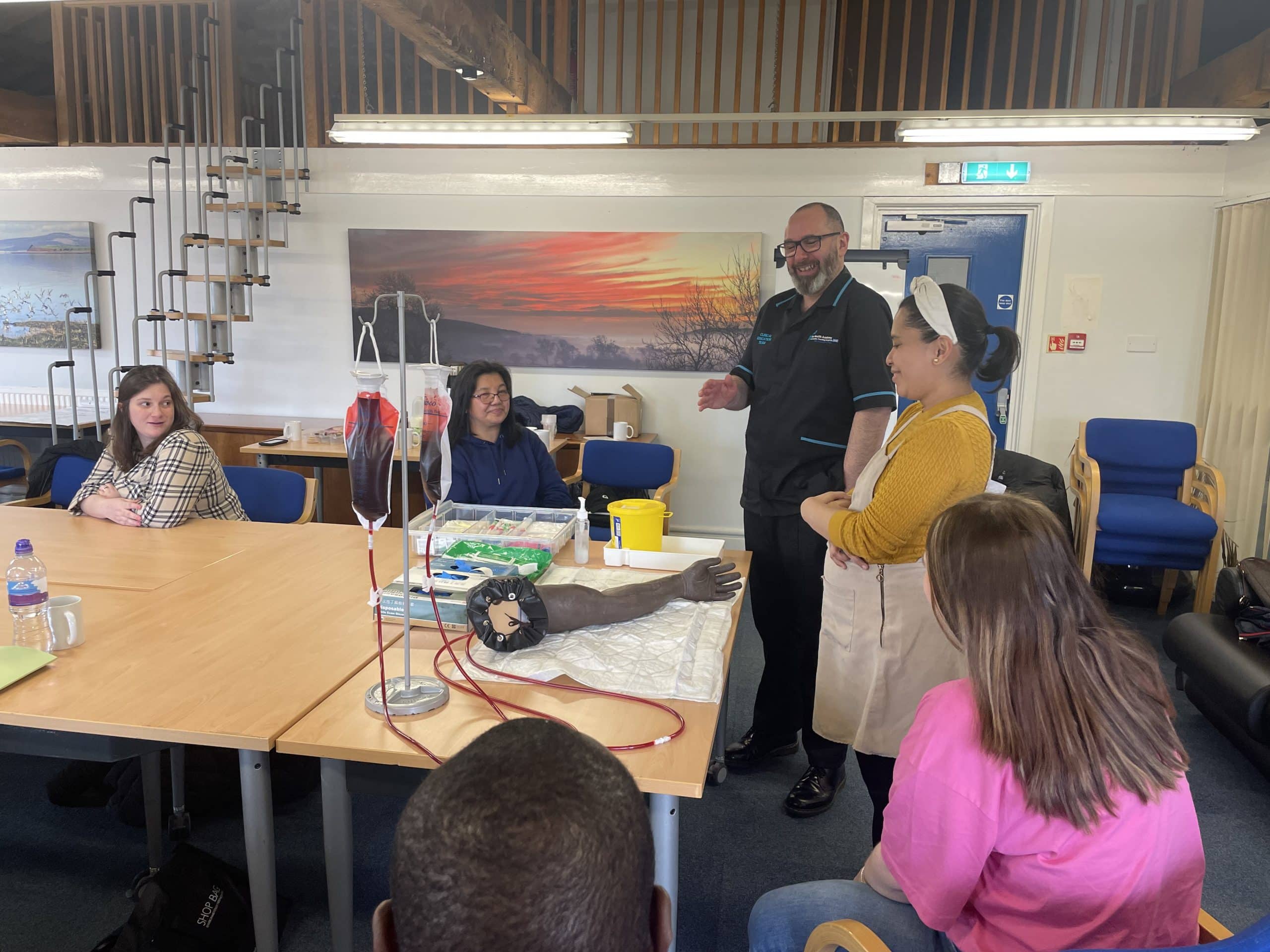

Social Care Nurses and Nurse Associates
Clinical Skills Training
Face to face training for Nurses in social care:
Catheterisation
- To be able to assess the need for catheterisation
- To ensure the practitioner is competent to catheterise a male and/or female patient urethrally by either an indwelling catheter or an intermittent catheter.
- Be aware of the different types of catheters available and which catheter to choose
- Improved knowledge of catheter maintenance solutions
- The importance of reducing infections in line with Saving Lives/Essential Steps documents from the DoH
- Manage a catheter in the hospital and/or a community setting
- Identify legal requirements e.g. documentation & consent
Tracheostomy Care
Lancashire and South Cumbria Regional Tracheostomy Team, this team has taken over the training we have previously provided.
Details on how to contact the team are below;
Lancashire and South Cumbria Regional Tracheostomy Team
Referrals : [email protected]
X previously known as Twitter : @thetracheteam
Mobile : 07543800752
Tissue Viability
- To provide awareness of the management and prevention of moisture associated tissue damage and pressure ulceration.
- What is Moisture Associated Tissue Damage?
- Awareness of Management & Prevention Pathway
- Product availability and when to use.
- What is a Pressure Ulcer?
- ASSKINg Bundle
- Intentional Rounding and Skin Assessment
- Contributing factors to Pressure ulceration formation
- Categorisation of pressure ulceration
Venepuncture Training
This venepuncture training course is aimed at Social Care staff, specifically registered nurses, carers and support workers who’s role include taking bloods.
This is ideal for staff who are looking to improve their skills in venepuncture.
The Venepuncture Training will aim to improve the students’ knowledge of the theory surrounding venepuncture including: the correct order of draw, the anatomy of veins and how to select a suitable site – allow students to practice using a synthetic arm.
If you have any questions regarding this event please email our inbox [email protected]
Clinical Skills Training with UCLan
Catheterisation Training with UCLan
This Catheterisation training course is aimed at Social Care staff, specifically registered nurses, carers and support workers.
Attendees will be undertaking a clinical skill within a simulated environment.
Prior to undertaking the skill, each attendee will be taught the context in which the clinical skills are being undertaken, such as primary or secondary care.
The content will include details on how to complete the skill, its suitability, contraindications, and other factors that may affect its delivery. Once the theoretical aspects have been taught will be followed by a demonstration of the skill by the academic, to both the whole class and repeated in designated groups.
This will be followed by the attendee attempting the skill via the equipment provided in the simulated environment, with feedback given by peers and academics.
Upon completion attendees will receive a certificate of attendance, not competence, as this will be determined by the employer and their policies regarding the clinical skill.
Method of learning In Person 6 hours total with 1 hour for lunch.
Please note lunch is not provided.
This course contains a full practical (face to face) session.
Delegates must attend in their uniforms as they will be in the skills labs for part of the session as the university has a protocol regarding appropriate clothing and footwear (the type you would wear for work. If you don’t have a uniform, could you please just ensure you wear flat shoes – no heels)
September 2nd Morning – Click here to book
September 2nd Afternoon – Click here to book
September 3rd Morning – Click here to book
September 3rd Afternoon – Click here to book
September 4th Morning – Click here to book
September 4th Afternoon – Click here to book
Venepuncture Training with UCLan
This venepuncture training course is aimed at Social Care staff, specifically registered nurses, carers and support workers who’s role include taking bloods.
This is ideal for staff who are looking to improve their skills in venepuncture.
The Venepuncture Training will aim to improve the students’ knowledge of the theory surrounding venepuncture including: the correct order of draw, the anatomy of veins and how to select a suitable site – allow students to practice using a synthetic arm.
Training includes but is not limited to:
Identify the suitable veins for Venepuncture
Identify the indications and contraindications for both the practitioner and the patient
To discuss the equipment used for performing Venepuncture
To be made aware of the full procedure and raise awareness for potential policy variations
To provide simulated practise in a controlled environment to help develop Venepuncture skills
To consider Venepuncture from patients point of view
Method of learning In Person 3 hours 45 mins
Morning sessions run from 08:30 until 12:30
Afternoon sessions run from 13:00 until 17:00
Please note: This course contains a full practical (face to face) session.
Delegates must attend in their uniforms as they will be in the skills labs for part of the session as the university has a protocol regarding appropriate clothing and footwear (the type you would wear for work. If you don’t have a uniform, could you please just ensure you wear flat shoes – no heels)
Lancashire and South Cumbria Social Care Nursing Advisory Council
Lancashire and South Cumbria Social Care Nursing Advisory Council
LSC Chair: Jane Green, RN ASC
The purpose of the Adult Social Care Nursing Advisory Council is to act as a platform for representatives of the Adult Social Care Sector to collaborate and raise the profile of nursing in social care, support future workforce development, explore solutions to the cores challenges and identify opportunities. The ASCNAC will work with the ICB Chief Nurse and ADASS Workforce Transformation and other partners across the ICS as an expert reference group that will support the growth and development of the workforce across the sector and promote quality improvement.
“The launch of social care nursing advisory councils across England was an exciting moment for our profession. These forums now act as touchstones for every ICB (Integrated Care Board) nurse, making sure social care nursing and the wider workforce are included in the development of nursing plans across all health and care settings. These peer advisory groups bring a wealth of experience, insight and expertise to the table, better informing the development of nursing practice, system-wide.” Prof Deborah Sturdy, Chief Nurse for Adult Social
For further information on the Outstanding Society visit https://theoutstandingsociety.co.uk/case-study/scnac/7-lancashire-south-cumbria/
Events
Social Care Registered Nurse Forum/Community of Practice
Exclusively for Registered Nurses across Lancashire & South Cumbria.
Do you want to keep updated with local and national health and care developments?
Would you like to be kept informed about training and development opportunities informed about training and development opportunities?
Would you like to meet colleagues and nurse leaders, have a safe space to raise issues, share your views and hear about best practice?
If you answered yes to any of the above, then the Social Care Nurses forum is for you.
With regular keynote speakers along with networking opportunities, this forum is exclusively for Registered Nurses in the Lancashire and South Cumbria regions.
Dates
Next COP date coming soon – to register your interest please email [email protected]
News
If you would like to receive the Lancashire & South Cumbria Social Care Training Hub Newsletter please email [email protected]
